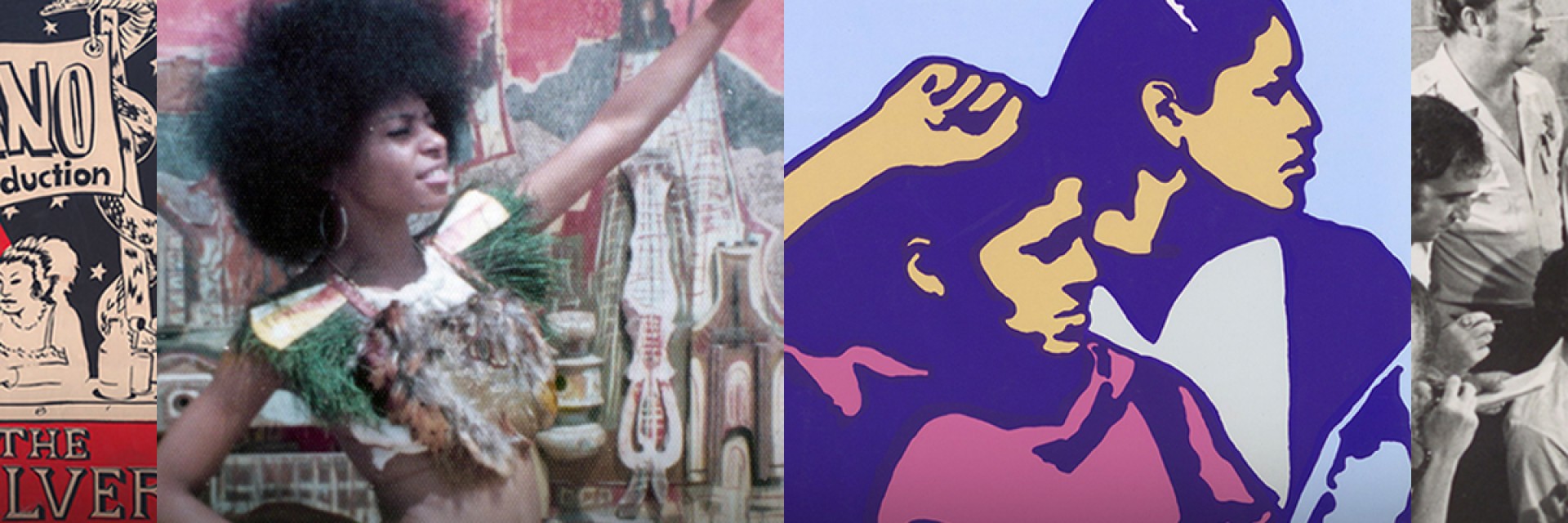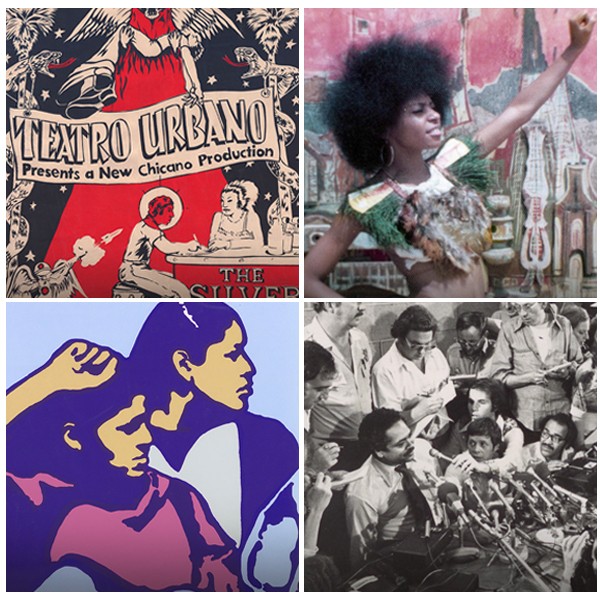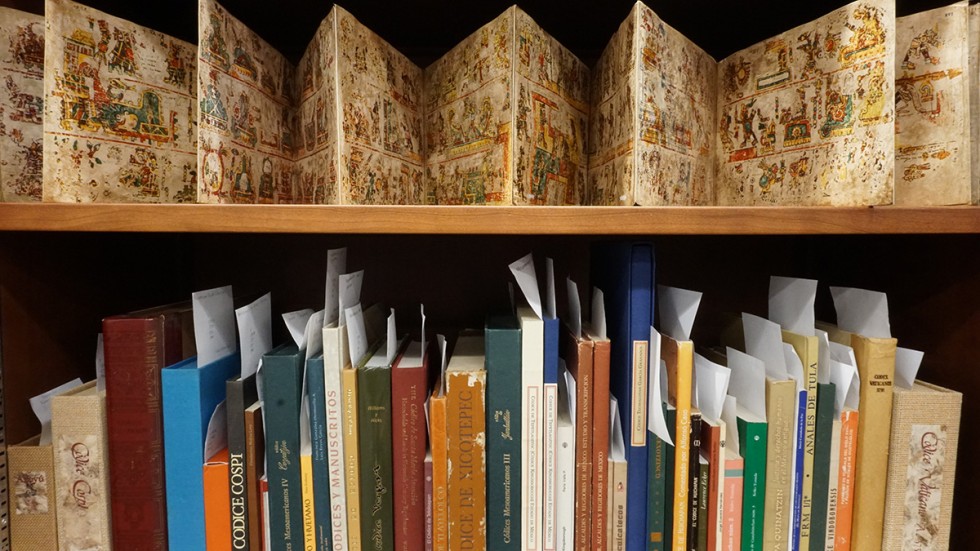COLLECTION DEVELOPMENT POLICY:
Guidelines
California State University, Los Angeles (Cal State LA) Special Collections and Archives (SCA) supports the discovery, learning and engagement goals of the University by identifying, acquiring, preserving, and providing access to unique and rare materials of enduring value.
The SCA collects distinctive collections and materials relating to Cal State LA, local, regional, and State history, and specifically the contributions of immigrants and communities of color. Items may include, but are not limited to, unpublished works such as personal papers and manuscripts, institutional and university records, photographs, and ephemera. Published materials may include books, periodicals, newspapers, and posters.
Scope
- Manuscript Collections
Although ‘manuscript’ refers specifically to handwritten materials, 'manuscript collection' is often used to include collections of mixed media in which unpublished materials predominate. They may also include typescripts, photographs, diaries, scrapbooks, news clippings, and printed works.” Manuscript collections may contain some printed/published material, but generally speaking, this material is collected and cataloged by libraries. Manuscript collections include those created by individuals and families, and by organizations such as businesses, fraternal groups, and nonprofits. Manuscript collections are also often referred to as “papers” (when discussing material generated by individuals and families) and “records” (when discussing material generated by organizations). - University Archives
SCA serves as the repository for the records of California State University, Los Angeles. Its primary purpose is to serve the administrative, teaching, research, and public service needs of the university and other user communities. The University Archives is the repository for records mandated by law, and other records and papers that have enduring value to documenting the history of the university. - Rare Books
Rare book collections contain books that are older or fragile and require the protection of a closed-stack, non-circulating environment. Examples are items that are rare, i.e. scarce and possibly irreplaceable; items that are of significant monetary value; items that are of artifactual significance; items that are in unusual formats or of unusual size. - Audiovisual Materials
SCA will work with donors to determine the types of audiovisual formats appropriate for the collection. Due to preservation and reformatting capabilities, we are not able to accept all media types. Decisions of acceptance will be based on file formats and the content of information represented in the files. Exceptions will be made only under certain circumstances. - Born Digital Materials
Due to preservation and reformatting capabilities, we are not able to accept all file types. Decisions of acceptance will be based on file formats and the content of information represented in the files. In some cases, we may accept files but cannot guarantee we can preserve the information in the same format.
Access and Use
Special Collections and Archives are available under the general archival principle of “equal access.” In addition, SCA abides by the “Joint Statement on Access to Original Research Materials” of the Society of American Archivists (SAA) and the Rare Books and Manuscript Section (RBMS) of the Association of College and Research Libraries (ACRL) of the American Library Association (ALA). The collections are available to Cal State LA, staff and faculty, visiting scholars, and the general public with the following stipulations:
- Materials do not circulate. Researchers may not take collection material outside the Special Collections Reading Room, and must accept and follow all rules and procedures set forth in the “Guidelines for Use of Special Collections Materials.”
- Where donors have placed restrictions upon collections, those restrictions shall be observed for their duration as well as any restrictions from federal and/or state statutes and laws.
- Where collections are fragile and could be damaged by further use or examination, such material may be withdrawn, at the discretion of an appropriate SCA staff member, until the material can be conserved or made available in another format.
- SCA staff has the authority and obligation to determine whether collection material is too fragile to be safely copied; in such instances, all means of creating the reproduction will be evaluated. The additional cost of that reproduction must be borne by the researcher.
- Requests for duplication of an entire collection may be denied if the SCA staff has reason to believe that such a copy is intended for deposit in another repository, is intended for public distribution on the web or otherwise, or may violate copyright law.
- Access to unprocessed collections is generally provided unless the collection is extremely disorganized, physically unstable, or is likely to contain confidential or rare materials. Portions of unprocessed collections may be restricted.
- There may be periods when some materials are not accessible to patrons in the Reading Room due to processing, preservation, or other related work activity. SCA staff will arrange to notify, when possible, individuals when materials are once again available.
Conditions Governing Acceptance of Materials
- The material must fit the current Collection Development Guidelines.
- The material must reflect the existing SCA subject strengths or areas with potential growth.
- The donor must be the owner of the collection or be authorized by the owner to transfer the collection.
- The donor must sign a deed of gift, transferring title to the physical property, within a reasonable period of time after receipt of the property by SCA. SCA will also seek, but will not require, the formal transfer of the owner’s copyrights in the collection.
- Generally, the copyright belongs to the creator of writings and other original material (such as photos and music) but can be legally transferred to heirs or others. SCA requests transfer of copyright to make it easier for researchers to use the materials in their work. However, SCA will consider a donation of the physical material without the donation of copyright in certain circumstances.
- The material must undergo archival appraisal and will be retained only if it has research value and documented authenticity. The material must be in a format that allows the department to preserve it and make it available for research. Material may be rejected if conservation costs to restore material are excessive. Likewise, the material may be rejected if the resources necessary to process, store, and/or make it accessible to researchers are beyond SCA’s capacity or outweigh the likely research value.
- The collection must be free of legal encumbrances and not received with any undue restrictions. While SCA desires to make all materials freely accessible to researchers, it will agree to reasonable and equitable restrictions for limited periods of time.
- SCA staff cannot give tax advice, nor are they permitted to appraise the monetary value of a collection or any materials. In certain circumstances, it may be possible for a donor to take a tax deduction for the donation of a manuscript collection to a repository. Donors are encouraged to speak with their tax accountants or attorneys about this possibility. It is up to the donor to arrange for and bear the cost of an appraisal for tax purposes.
- The donor gives consent to SCA to digitally reformat the collection or migrate existing digital content to new technical environments as appropriate for preservation and/or access purposes. However, this is not a commitment to digitize the collection. SCA does not have the resources to digitize collections, or significant portions of collections, for donors. Exceptions may be made in instances where the donor is able and willing to support additional resources for a digitization project, through a donation of funds; such exceptions will be made on a case by case basis.
Acquisitions/Donations/Transfers
Acquisition is the formal process of obtaining or accepting special collections materials through donation, bequest, transfer, or other exchange. Only materials relevant and valuable to the mission, values, and vision of California State University, Los Angeles and the University Library will be considered for acquisition and accession. The Library’s Acquisitions or Special Collections & Archives (SCA) units have the right to refuse any donations which do not fit into the collection policy as described in the collection policy statement, the mission statement, and its core mission. Other factors contributing to the acceptance or declination of a donation include conservation issues, space, storage factors, and processing costs.
- University Archives Acquisition
In assessing records appropriate for permanent retention, the Archives collects the official documentation produced from the conduct of university business. When permanent records are transferred to the Archives, they are maintained there for the future. After the retention period has passed, the records may be used by researchers. Records eligible for transfer are those which are no longer active and are listed on an approved records schedule as being of permanent value. The retention period is described in the California State University Records Retention & Disposition Schedules.- Official Records of the California State University, Los Angeles
University records can include but are not limited to, correspondence, reports, minutes, directives, announcements, publications, architectural and building plans, and any other materials produced by the university in pursuance of its functions in all media both analog and digital, including photographic and audiovisual materials. The archives also manages the publications, newsletters, or booklets distributed by the university including dissertations and theses. The archives may consider retaining selected artifacts/ephemera relating to the history of the university. - Papers of California State University, Los Angeles
The following types of documentation in all formats reflect and illuminate the careers of the Cal State LA faculty and are sought by the archives: official, professional, and personal correspondence; biographical material; photographs; teaching notes; research files; department or committee minutes and records; diaries; and scrapbooks. - Records of Students, Student Organization and Affiliated Organizations
The following types of documentation in all formats reflect the student life and culture of the California State University, Los Angeles and are sought by the archives: student organizations and student life and culture of Cal State LA. Materials include administrative records, academic affairs, and publications, and student and alumni personal papers related to their time at Cal State LA. Materials take the form of letters, schoolwork, event programs, photographs, and fliers. - University Record Transfer Instructions
- Identify Records eligible for Transfer
- Consult the Records/Information Retention and Disposition Schedule to make sure the records have passed their retention and are eligible for transfer to the University Archives.
- Contact SCA once records are identified as eligible for transfer.
- Pack Records
- Make sure records in boxes are inventoried and properly labeled.
- Complete Transfer Form (see Appendix 1.3)
- Arrange for Pickup
- Identify Records eligible for Transfer
- Official Records of the California State University, Los Angeles
- Manuscript Collections
SCA seeks donations of as little as a single item and as large as several hundred boxes. The material does not need to be organized; it does not need to be “old”; and the material does not need to relate to a famous individual, event, or organization in order for it to be historically significant. Generally, SCA is interested in a coherent body of material rather than individual items.- Personal Papers
SCA must be permitted to survey papers or records in order to determine which materials have enduring historical value. Materials include, but are not limited to personal and professional correspondence, diaries, memoirs, or journals, legal documents, research files, scrapbooks, ephemera, photographs, sound recordings, videotapes, artistic or other creative materials, books, articles, scripts, and final drafts. - Records from Organization and Institutions
SCA is interested in the records that best illustrate the purpose, activities, and policies of an organization. Records should be inactive, no longer regularly used for routine business. Before records are transferred, SCA must survey them or speak with knowledgeable staff to determine which materials have enduring historical value.
- Personal Papers
- Rare Books
SCA acquires rare books in the following ways: donations or purchase. Decisions to accept the transfer of donated material are based on the professional judgment of the SCA staff and the collection development guidelines. Purchase recommendations may be made to SCA staff who will make decisions based on the merits of the materials to advance research in the university community.
AREAS OF FOCUS:
History and Culture of Los Angeles
Cal State LA Library Special Collections documents the history and culture of communities in Los Angeles. Emphasis on publications in Los Angeles history, literature, the arts, and the papers of public official, and ethnic communities.
Current Holdings:
- East LA Archives
- Gloria Arellanes Papers
- Carlos Montes Papers
- East Los Angeles Community Union
- Jose R. Figueroa Papers
- InnerCity Struggle
- David Sandoval Papers
- Mexican American Baseball
- Compton Communicative Arts Academy Collection
- Central American Solidarity Network
- Central American Memoria Histórica Project
- Chinese Oral History Project
- Public Officials
- Richard Alatorre Papers
- Mervyn M. Dymally Papers
- Ernest E. Debs
- Julian Nava
- John C. Holland
- Julian C. Dixon
- Stan Kenton Collection of Musical Recordings & Personal Papers
- Papers of Anthony Quinn, including collection of film scripts
Collecting Priorities:
- East Los Angeles
- Social Justice Movements
- Ethnic and Immigrant Communities
- Women of color
- LGBTQIA communities of color
- Los Angeles Public Officials
Mesoamerica and Colonial Mexico
The collection is divided into three large groups: The Mesoamerican, the Colonial, and the Independent periods that form the sequence of the history of Mexico. The collection includes facsimile editions of the Pre-Columbian Codices, such as the Borgia, Nuttall, Fejervary-Mayer, Vaticanus A and B, Selden, Borbonicus, Boturini, Mendoza, De la Cruz-Badiano, Florentine Codex. Some of the editions are accompanied by analysis and annotations by Nineteenth and Twentieth-century scholars such as Alfredo Chavero, Francisco del Paso Y Troncoso, Eduard Seler, and José Fernando Ramírez, among others.
Current Holdings:
- John B. Glass Papers
- Wayne Ruwet Papers
- Mesoamerican and Colonial Mexico Rare Books
Collecting Priorities:
- Rare books
- Personal Papers
- Artifacts
HISTORY OF CAL STATE LA
The Cal State LA University Archives acquires university records, professional and research papers of Cal State LA faculty, materials that relate to Cal State LA student life and culture, and other archival materials affiliated with Cal State LA. University records can include but are not limited to, correspondence, reports, minutes, directives, announcements, publications, architectural and building plans, and any other material produced by the university in pursuance of its functions in all media both analog and digital, including photographic and audiovisual materials. The archives also manages the publications, newsletters, or booklets distributed by the university including dissertations and theses. The archives may consider retaining selected artifacts relating to the history of the university.
Current Holdings:
- Yearbooks
- College Times/ University Times
- Campus Photographs
- Faculty Paper
- Faculty Publications
- Roy and Johana Harris Collection of Musical Scores & Personal Papers
Collecting Priorities:
- Official university records in accordance with the Cal State LA University Records management policies
- Papers of Cal State LA Faculty
- Student Life and Culture, Student Organizations and Affiliated Organizations
- University photographs and audiovisual materials
- University publications
Growth Areas
- Women in Science Fiction and Fantasy
- Poetry and Poets of Color in Los Angeles


